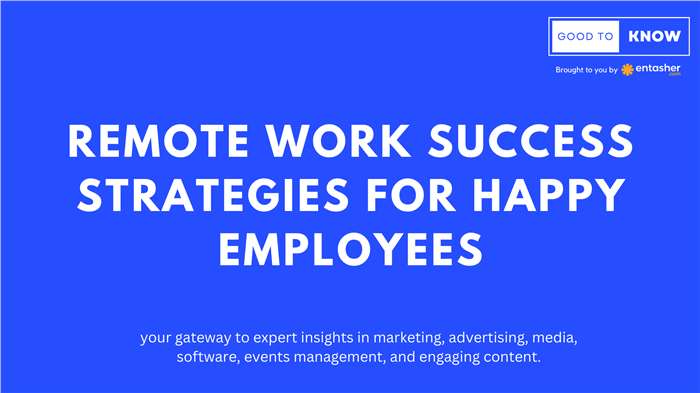
Remote Work Success: Strategies for Happy Employees ✽

This content sponsored by Entasher.com
Controlling employees working remotely efficiently requires a thoughtful and proactive approach to ensure productivity, communication, and collaboration are maintained. Here are some strategies to help you effectively manage remote employees:
- Set Clear Expectations: Clearly communicate the work hours, tasks, and deliverables expected from remote employees. Establish clear goals and deadlines to ensure everyone is on the same page.
- Use Collaboration Tools: Utilize collaboration and project management tools that facilitate communication and teamwork. Tools like Slack, Microsoft Teams, Asana, or Trello can help employees stay connected and track progress on projects.
- Regular Check-ins and Meetings: Schedule regular one-on-one check-ins and team meetings to discuss progress, address any challenges, and ensure everyone is aligned. Video calls can enhance engagement and maintain a sense of connection.
- Encourage Open Communication: Create a culture of open communication where employees feel comfortable sharing their ideas, concerns, and feedback. This fosters a positive and supportive remote work environment.
- Measure Performance Objectively: Focus on measuring employees' performance based on outcomes and results rather than the number of hours worked. Set key performance indicators (KPIs) and evaluate performance based on achieving these targets.
- Provide Necessary Resources: Ensure remote employees have access to the necessary resources, such as equipment, software, and training, to perform their tasks effectively.
- Offer Professional Development Opportunities: Invest in the professional development of remote employees. Offer virtual training sessions, webinars, or online courses to enhance their skills and knowledge.
- Promote Work-Life Balance: Encourage a healthy work-life balance among remote employees. Remind them to take breaks, set boundaries, and avoid overworking.
- Recognize and Appreciate: Acknowledge the efforts and achievements of remote employees. Recognize their contributions and celebrate successes to boost morale and motivation.
- Monitor and Address Performance Issues: Keep track of employees' performance and address any performance issues proactively. Provide constructive feedback and support to help employees improve.
- Foster Team Building: Organize virtual team-building activities and social events to strengthen team bonds and boost camaraderie.
- Encourage Peer Support: Promote peer support and collaboration among remote team members. Encourage them to assist each other and share knowledge.
- Be Mindful of Time Zones: If you have a geographically dispersed team, be mindful of different time zones and try to schedule meetings and tasks at reasonable hours for everyone.
- Stay Accessible and Responsive: As a manager, remain accessible to your remote employees. Respond promptly to their queries and concerns to maintain effective communication.
By implementing these strategies, you can create a positive remote work environment where employees feel supported, engaged, and motivated to perform at their best. Effective management of remote employees leads to increased productivity, higher job satisfaction, and ultimately, the success of your organization's remote work initiatives.


